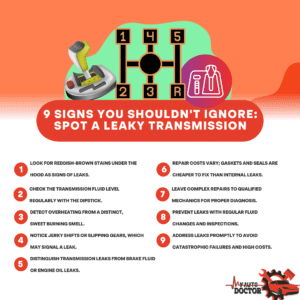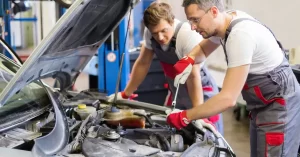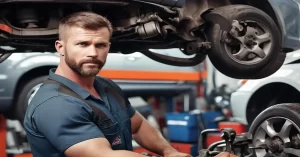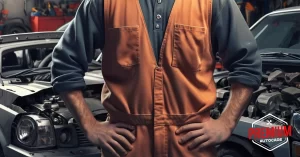Don’t Ignore the Drip! Why a Leaky Transmission is a Big Deal
A puddle forming beneath your car might seem like a minor inconvenience, but a leaking transmission is a serious problem that shouldn’t be ignored. The transmission is the unsung hero of your car, the complex machinery responsible for smoothly transferring engine power to the wheels. Without a healthy transmission, even a powerful engine becomes useless. A leaking transmission signifies a breach in its intricate network of fluid passageways, leading to a potential loss of lubrication and a domino effect of internal damage.
Understanding Your Transmission: The Powerhouse of Your Car
Think of your transmission as a highly-skilled conductor of an orchestra. It takes the raw power generated by the engine (the musicians) and translates it into a symphony of gear changes (the musical movements), ensuring your car operates at the optimal speed and torque (the perfect harmony). This intricate system relies on a specific type of fluid – transmission fluid – to keep everything moving smoothly. Transmission fluid serves two purposes: it reduces friction between moving parts and dissipates heat generated during operation by acting as a lubricant and coolant.
The Signs of a Leaking Transmission: Spotting Trouble Early
Early detection is key when it comes to a leaking transmission. Here are some telltale signs to watch out for:
- Fresh Stains Under the Hood: Park your car on a clean, level surface overnight. If you find reddish-brown stains in the morning, especially concentrated around the underside of the engine or the transmission pan, it could be a sign of a leak.
- Low Transmission Fluid Level: Check your car’s dipstick for the transmission fluid level. To make sure you are doing things correctly for your vehicle, it’s best to check your owner’s manual. A low fluid level indicates a potential leak.
- Burning Smells: Transmission fluid has a distinct, slightly sweet odor. If you smell something burning while driving, it might mean that your transmission fluid is overheating due to a leak.
- Shifting Problems: A healthy transmission ensures smooth gear changes. If you experience jerky shifts, delayed engagements, or slipping gears, it could be due to a lack of proper lubrication caused by a leak.
Identifying a Transmission Leak
Check Under the Hood: Fresh Stains and Low Fluid Levels
As mentioned earlier, a fresh reddish-brown stain beneath your car, particularly near the engine or transmission pan, is a strong indicator of a leak. Regularly checking your transmission fluid level can help detect potential leaks before they become severe.
The Telltale Signs: Burning Smells and Shifting Problems
A burning odor emanating from your car while driving, accompanied by erratic shifting patterns, is a cause for concern. The burning smell signifies overheating transmission fluid, often caused by a leak leading to insufficient lubrication. In severe cases, a burning smell accompanied by visible smoke requires immediate pullover and calling a tow truck.
Don’t Be Fooled! Other Car Fluid Leaks Explained (Brake Fluid, Engine Oil)
While reddish-brown stains might point towards a transmission leak, it’s important to differentiate it from leaks in other car fluid systems. Here’s a quick guide:
- Brake Fluid Leak: Brake fluid is typically a light yellow or amber color. A leak in the brake system is a critical safety hazard and requires immediate attention.
- Engine Oil Leak: Engine oil is usually black or dark brown. While an engine oil leak is less urgent than a transmission leak, it should still be addressed promptly to prevent engine damage.
The Cost of Fixing a Leaking Transmission: A Breakdown
The cost of repairing a leaking transmission varies depending on the severity and source of the leak, as well as the make and model of your car. Here’s a breakdown of some common scenarios:
Diagnosis Matters: Pinpointing the Source of the Leak
Accurate diagnosis is crucial before embarking on repairs. A qualified mechanic will employ visual inspections, specialized tools, and potentially a test drive to pinpoint the exact location of the leak.
Gaskets & Seals: The Most Common Culprits (Costs and Labor)
Worn or damaged gaskets and seals are the most frequent culprits behind transmission leaks. Replacing these components is a relatively inexpensive fix, typically ranging from $100 to $300 for parts and labor.
Transmission Pan Issues: Cracks, Dents & Worn Gaskets (Repair Options & Estimates)
The transmission pan, the underbelly of the transmission, can develop cracks, dents, or a failing gasket. Repairs may involve patching a small crack, replacing a dented pan, or replacing the gasket based on the extent of the damage. Costs can range from $150 to $500.
Transmission Fluid Lines: Addressing Worn or Damaged Lines (Replacement Costs Explained)
Transmission fluid lines carry fluid throughout the system. Worn or damaged lines can develop leaks. Replacing these lines can be a more involved process, depending on the location and accessibility of the lines. Expect costs to fall between $300 and $700 for parts and labor.
Converter Seal Failure: A More Complex Leak (Symptoms, Diagnosis & Repair Costs)
The torque converter, a vital component within the transmission, utilizes a seal to prevent leaks. A failing converter seal can manifest as a leak near the front of the transmission and might be accompanied by a shuddering sensation while driving. Diagnosing and repairing a converter seal leak is a more complex job, often costing between $800 and $1500.
Internal Transmission Leaks: The Most Expensive Scenario (When to Consider Replacement)
In the worst-case scenario, the leak originates from within the transmission itself, signifying worn internal components. Repairing such leaks necessitates a complete transmission overhaul, which can be prohibitively expensive, sometimes exceeding the value of the car itself. In such cases, replacing the transmission entirely might be a more cost-effective solution.
The Road to Repair: Making Informed Decisions
DIY or Hire a Pro? Weighing Your Options (Costs & Considerations)
Unless you possess significant mechanical expertise and the necessary tools, tackling a transmission leak repair yourself is not recommended. The complexity of the transmission system and the potential for further damage make it a job best left to a qualified mechanic.
Finding a Reputable Transmission Repair Shop: Ask the Right Questions
When searching for a repair shop, prioritize experience and expertise in transmission repair. Ask questions about their diagnostic procedures, the types of warranties offered, and whether they use genuine or high-quality aftermarket parts.
Getting Quotes and Estimates: What to Expect Before the Fix
Obtain written quotes from several reputable shops before making a decision. The quote should detail the suspected source of the leak, the recommended repairs, the estimated cost for parts and labor, and the anticipated turnaround time.
Beware of Hidden Costs: Understanding Additional Parts & Labor
While the initial quote might seem straightforward, there’s a chance of encountering additional costs during the repair process. Worn transmission mounts, contaminated fluid requiring a complete flush, or unforeseen complications can add to the final bill. Ensure you understand the shop’s policy on handling such unforeseen circumstances.
Preventing Future Leaks: Maintenance Tips for a Healthy Transmission
Regular Transmission Fluid Changes: How Often and Why
Regular transmission fluid changes are vital for maintaining a healthy transmission and preventing leaks. Consult your owner’s manual for the recommended service intervals, which can vary depending on your car’s make, model, and driving habits. Typically, transmission fluid changes are recommended every 30,000 to 60,000 miles.
Routine Inspections: Catching Small Leaks Before They Become Big Problems
Don’t wait for symptoms to appear before taking action. Schedule regular inspections, particularly before embarking on long trips. A qualified mechanic can identify potential leaks and address them before they cause significant damage.
Avoiding Bad Towing Habits: Protecting Your Transmission During Tows
Improper towing techniques can put undue stress on your transmission, potentially leading to leaks. If your car needs to be towed, ensure the tow truck operator uses a flatbed tow truck that secures all four wheels to prevent the transmission from turning while the vehicle is being towed.
Listen to Your Car: Unusual Sounds and Shifting Patterns
Pay close attention to any unusual sounds emanating from your car while driving, such as grinding or whining noises. These could be signs of internal transmission wear that might lead to leaks. Additionally, any hesitation or roughness during gear changes warrants a visit to a mechanic.
Living with a Leaky Transmission: Temporary Solutions (Not Recommended!)
Adding Transmission Fluid: A Temporary Fix, Not a Long-Term Solution
Topping off your transmission fluid might seem like a quick fix for a leak, but it’s a temporary solution at best. The underlying cause of the leak remains unaddressed, and the added fluid might mask the problem until it becomes more severe.
The Dangers of Ignoring a Leak: Potential for Major Damage
Ignoring a transmission leak is a recipe for disaster. The lack of proper lubrication can cause increased friction, faster wear of internal components, and eventual transmission failure. This can render your car immobile and result in a significantly more expensive repair bill.
When It’s Time to Face the Music: Signs You Need a Transmission Replacement
In some cases, a transmission leak might be a symptom of extensive internal damage, making a complete transmission replacement the only viable solution. Here are some signs that point towards a possible transmission replacement:
- Multiple Leaks: Leaks originating from various locations within the transmission suggest widespread internal wear.
- Burning Smell & Smoke: A persistent burning odor accompanied by visible smoke signifies severe overheating and potential internal damage.
- Complete Loss of Gears: If your car struggles to engage any gears or exhibits a complete loss of power, it could be a sign of a catastrophic transmission failure.
Taking Care of Your Transmission: An Investment in Your Car’s Future
Your transmission is a complex and vital component of your car. Ignoring a leak is akin to neglecting a ticking time bomb. By addressing a leak promptly and following a proper maintenance routine, you can ensure your transmission operates smoothly for years to come, saving you from a potentially costly future repair.
Peace of Mind on the Road: The Value of a Properly Functioning Transmission
A healthy transmission translates to a smooth, enjoyable driving experience. You can navigate city streets and highways with confidence, knowing your car will respond flawlessly to your every command. A properly functioning transmission contributes to better fuel efficiency and saves you money at the pump.
Resources & Next Steps: Finding a Qualified Repair Shop Near You
If you need to find a reliable transmission repair shop in your area, the internet can be a great resource. When searching for transmission repair shops, look for those with positive customer reviews and certifications from reputable organizations. Don’t hesitate to call several shops and inquire about their experience, warranties, and pricing before making a decision.
Taking care of your car’s transmission doesn’t have to be overwhelming. By following the tips outlined above, you can identify leaks early, make informed repair decisions, and ensure your car continues to perform reliably for miles to come. Remember, a healthy transmission is an investment in your car’s future and your peace of mind on the road.
Skip the Drip, Keep Cruisin’! My Auto Doctor – Your Odessa Transmission Leak Repair Experts
Don’t let a leaky transmission put a damper on your Odessa adventures! Here at My Auto Doctor, our certified technicians are experts in transmission leak repair in Odessa, TX. We provide upfront quotes and a complimentary consultation for your vehicle’s condition assessment. Schedule your appointment today and get back on the road with confidence!






